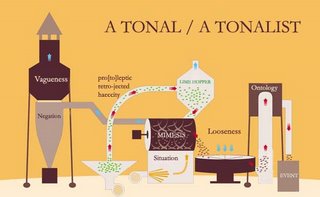
I thought it worthwhile to give some response to Kasey’s A Tonalist post on his Lime Tree blog.
First I think Kasey does a fine job of summarizing many of the points I sought to make. There may be a light bit of flarfist mockery of all the philosophic-theoretical diction, but it’s not farce, rather it’s a careful reading with serious wonderings. He’s also right to note that, whatever may be said of Flarf now, I feel there’s no great urgency to begin assembling the borders of what it could or could not become over time. Same with A tonalist perhaps.
As I see it there’s only one thing in his post that asks for response, which is his point in the last paragraph that "A tonalism is fairly recondite about its ontological convictions."
I'd want to first reiterate that the A tonalist, as I see it anyways, is certainly developing differently from how Language Poetry or Flarf developed, and these differences are to some degree readable, certainly suggestive, as possible deeper differences. Still I won't make much of a claim in that direction, because I'm not yet sure I can say what the differences in kind might be, but it's not impossible they are more than a difference in degree.
I also want to take the opportunity, here, to keep in mind that the blogsite for A tonalist notes (I follow Laura in using only A tonalist rather than any A tonalism, in the same way there were Situationists but no Situationism) has many "contributors" with very ambiguous relations to the A tonal, and who certainly are not regularly consulted in any way, and who should therefore not be thought unified in any convictions, ontological or otherwise.
Meanwhile it’s the case that Laura invited us onto the blog; she has done all the initial writing on the A tonalist; she has made the claim and could still make the claim that a given something is specifically allied in a given somewhere within the writing of a grouping of poets.
(Gary Sullivan might have once had a similar primary "possession" of flarf, but has tried to distribute it since then; also differently, it was created in the course of an aesthetic act, not reading into the works of existing writers or past productions per say.)
This is what I wrote to Standard Schaefer the other day: "Laura is intuiting what is a very specific sensibility already ‘there,’ among people she has been reading, something that is not just subtle but also in motion, and I think she meanwhile acknowledges that it's not easy to do that. Such an acknowledgement is both an invitation and a stricture. It manifests, I think, the difficulty of giving away a thought to others even as it is born of her own thought and ‘deal’."
What I have tried to do is to read her thought as open enough to allow me to fit my own terms into it in a way that is necessarily, because it is hers, limited, and thus requires a sense of stricture and care in my thinking towards it. The point is that the A tonal has both the specificity of a "truth" which stands at the points Laura determines, and the multiple openness of those places she determines not to determine it (which, as in her writing, has turned out to be almost everywhere except in specific events of art).
I think this is what Kasey hears as reconditeness of ontological conviction: both that there are many others Laura considers A tonal with no doubt a multiplicity of feelings about what Laura is pointing towards, plus the irreducible fact that Laura herself has initiated and is willing to still hold the ongoing intuition into what I want to describe as a either a gesture without movement or a movement restricted to gestures.
What the A tonalist offers in terms of conviction, then, is another idea for experiencing aesthetic groupings, one not authoritarian or singular in the Bretonian vein (because always with Laura’s ongoing ambiguousness as to what its "style" is), yet still with specificity and rule (because Laura continues to be the holder and noticer of what its "orientation" is). Chris Vitiello wrote me an email that used these terms for it: "looseness without vagueness."
Or: the project is to assert without silencing. Put in those terms, the A tonal is not only a political problem, it’s the political problem. To me it seems fairly clear as a conviction and a sense of lived being, too.

0 Comments:
Post a Comment
<< Home